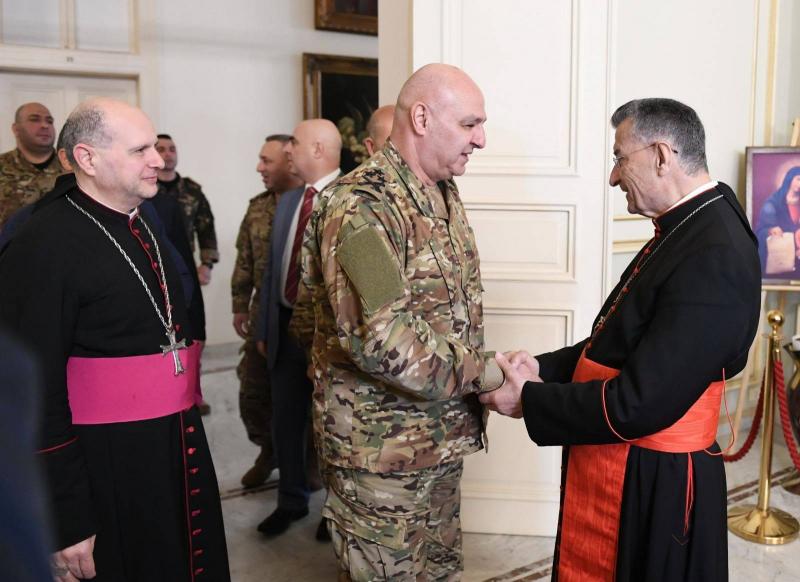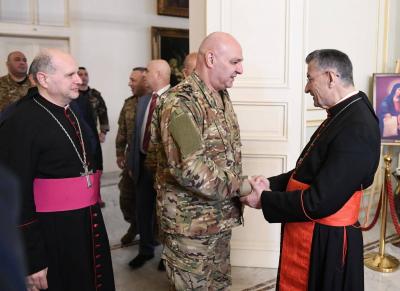Maronite Patriarch Bechara Al-Rahi is concerned about the possibility of the army leadership falling into a void. He sees a scheme aimed at undermining all the institutions that keep this entity "standing on its feet." He views any attack on the army as akin to rolling the last stone that the state is built upon, which is why he is firm on this issue and will not allow stability to be shaken, despite reports of a potential resolution to this matter.
Those who expect that exhaustion might overtake Al-Rahi or that he might despair over the vacancy in the army leadership will have to wait a long time, according to church sources, which affirm that Al-Rahi will adopt a higher tone in the coming days and weeks to avoid reaching the prohibited threshold.
The sources express astonishment at the convergence of political figures who have never united to manage the affairs of the people and the state, now coming together to strike at the army leadership, hinting at the collaboration between the head of the "Maronite Movement" Sleiman Frangieh (before he retracted his position) and "Free Patriotic Movement" leader MP Gebran Bassil in rejecting the extension of Army Commander General Joseph Aoun's term, as if there is a desire to "complete the scheme to undermine the state and eliminate any honest person during these difficult times."
The sources tell "Nidaa Al-Watan" that political animosity outweighs the file relating to national security, which is reflected in the Shiite duo's refusal to extend Aoun's term in the Parliament, noting that the proposal was initiated by the "Lebanese Forces" parliamentary bloc, with the "duo" returning the ball to the government's court, which is theirs. On the other hand, the Minister of Defense in the caretaker government, Maurice Slim, continues to execute policies and programs from his ministry and does not submit a proposal to the Cabinet to avoid a leadership vacuum in the army out of revenge against the commander for refusing to comply with a demand to undermine "the revolution," and to remove his name from the list of presidential candidates.
While both the duo and Bassil obstruct the extension of the army commander, Patriarch Al-Rahi communicates with all forces and does not observe any opposition from caretaker Prime Minister Najib Mikati regarding the extension for the army commander; however, he affirms that the ball is not in his court, but rather in the court of the Minister of Defense or Parliament, where real pressure should be applied. Mikati reassures the patriarch that discussions are ongoing about all necessary legal solutions, but all news does not give Al-Rahi solace until matters are decisively settled, as there is no trust in the officials.
Bassil has plugged his ears to Al-Rahi's voice and continues a policy of undermining positions to remain alone in the arena, but the patriarch, according to church sources, views the vacuum in the army leadership as a matter of life and death. They reject the appointment of an army commander or any other official in the absence of a president for the republic, while at the same time obstructing electoral sessions. The overseers of the council have not called for an electoral session since June 14, so what is the dilemma? What is their plan? How can they leave the army without leadership while the region is experiencing war and the country stands on the brink of conflict?
The sources call on both Christian and non-Christian political forces to rise above narrow political calculations and to refrain from engaging in "hostilities" and to expedite the extension decision, emphasizing that the military situation cannot tolerate any manipulation in the army leadership. The issue is not merely about extending Joseph Aoun's term or not, but rather it is tied to the existence of the entity itself; the danger is significant, and leaving the army without a head causes upheaval in the country's national security.
In the coming days, Patriarch Al-Rahi will heighten the intensity of his rhetoric and will not concede on the demand to protect the army and the country's national security. He awaits from any opponents of the extension to provide an alternative or a legal proposal that protects the army and the country from the threat of collapse. Bkerke sees a bleak picture and fears the existence of a scheme to continue the collapse, as the economic bankruptcy of banks, companies, and public and private institutions has led Lebanon into a dark economic tunnel, and now the security collapse may unfold, potentially being the most difficult category of collapse.




